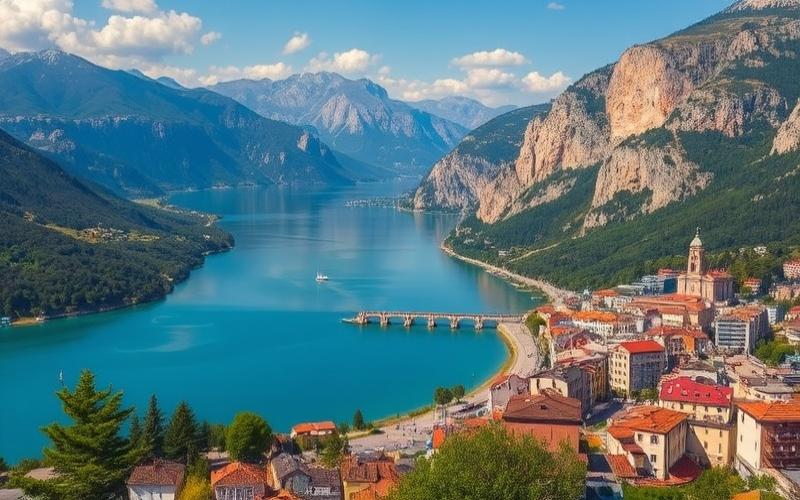
 Published on and written by Cyril Jarnias
Published on and written by Cyril Jarnias
Montenegro, a small Balkan country experiencing economic growth, is attracting more and more foreign entrepreneurs drawn by its potential. However, starting a business in this country requires careful preparation and knowledge of local specifics. Here are the main pitfalls to avoid to maximize your chances of success.
A Sloppy Business Plan: The Recipe for Failure
Too many entrepreneurs underestimate the importance of a solid business plan, especially in an international context. In Montenegro, this mistake can prove fatal. The local market, although promising, remains relatively small with its 620,000 inhabitants. Thorough market research is therefore essential to identify real opportunities and adapt your offering.
Don’t forget to incorporate the country’s cultural and economic specificities. Montenegro heavily focuses on tourism and services, but other sectors like renewable energy or information technology also offer promising prospects. Your business plan must demonstrate a deep understanding of the local environment.
Finally, be realistic in your financial projections. The average salary in Montenegro is about 530 euros per month in 2025, which impacts purchasing power. Take these data into account to establish credible forecasts.
Good to know:
Get assistance from a local expert to refine your business plan. The Chamber of Commerce of Montenegro offers advisory services to foreign investors.
Risky Financial Management: Danger Ahead!
Poor financial management is often the cause of business failures, including in Montenegro. Foreign entrepreneurs tend to underestimate certain costs specific to the country.
Setup costs can be higher than expected. Although the business creation process has simplified in recent years, expect to spend about 1,500 euros on administrative procedures and opening a bank account. Also, don’t forget the minimum share capital required, which varies depending on the type of company chosen.
Montenegrin taxation, although relatively advantageous with a 9% corporate tax rate, has subtleties to master. For example, companies generating more than 18,000 euros in annual turnover must register for VAT (21%). Rigorous tax planning is essential to optimize your cash flow.
Finally, anticipate seasonal variations, especially if your activity is related to tourism. The Montenegrin economy experiences peaks in summer, followed by quieter periods. Plan for sufficient reserves to get through the off-season months.
Good to know:
The Montenegrin government offers tax incentives for certain investments, particularly in special economic zones. Inquire with the Montenegrin Investment Promotion Agency.
Neglected Regulations: The Legal Headache
Neglecting local regulations is a common but potentially disastrous mistake. The Montenegrin legal framework has evolved significantly in recent years, particularly with the aim of joining the European Union.
Administrative formalities, although simplified, remain complex for a foreigner. Company registration can theoretically be done in 4 days, but in practice, expect 2 to 3 weeks. You will notably need to obtain a tax identification number and register with social security bodies.
Labor legislation deserves particular attention. Montenegro adopted new laws in 2023 to align with European standards. For example, the legal working week is 40 hours, with specific provisions for overtime. Ignoring these rules can lead to heavy fines.
Also, don’t forget sector-specific regulations. If you operate in tourism, for example, you will need to obtain specific licenses from the Ministry of Sustainable Development and Tourism.
Good to know:
It is highly recommended to hire the services of a local lawyer to navigate the Montenegrin regulatory maze. The Montenegrin Bar Association can help you find a qualified professional.
Underestimated Competition: Beware of Overconfidence
Underestimating competition is a classic mistake, particularly dangerous in a small market like Montenegro. Although the country offers real opportunities, competition can be fierce in certain sectors.
Tourism, a pillar of the Montenegrin economy, is a particularly saturated sector. In 2024, the country welcomed over 2.5 million tourists for a population of 620,000 inhabitants. If you’re targeting this market, you’ll need to stand out with a truly innovative offering or a very targeted positioning.
Even in less developed sectors, don’t neglect local competition. Montenegrin companies benefit from deep market knowledge and well-established networks. They can also take advantage of certain benefits reserved for national companies, particularly in public procurement.
Also, don’t forget international competition. Montenegro is attracting more and more foreign investors, especially from neighboring countries like Serbia or Croatia. These companies may have significant resources and valuable regional experience.
Good to know:
The Montenegrin Competition Protection Agency regularly publishes sector reports that can help you better understand the competitive landscape.
Winning Strategies: Keys to Success in Montenegro
To maximize your chances of success in Montenegro, here are some proven strategies:
1. Bet on Local Partnerships
Partnering with a Montenegrin partner can open many doors. You’ll benefit from their market knowledge, networks, and understanding of the local business culture.
Choosing the right partner is crucial. Take the time to research thoroughly, meet several potential candidates, and carefully check their backgrounds. The Montenegrin Investment Promotion Agency can assist you in this process.
2. Invest in Training
The Montenegrin workforce is generally well-trained, but you will likely need to invest in continuous training for your employees. This will not only improve their productivity but also help retain them in an increasingly competitive job market.
Don’t forget to train yourself in the local business culture. Personal relationships play an important role in business in Montenegro. Learning a few words of Montenegrin and familiarizing yourself with local customs will be highly appreciated.
3. Leverage Digital Opportunities
Montenegro is heavily investing in its digital infrastructure. The country aims to become a regional technology hub and offers attractive tax incentives for companies in the sector.
Even if your activity isn’t directly related to digital, don’t neglect this aspect. A strong online presence and the use of digital tools can give you a significant competitive advantage.
4. Adopt a Sustainable Approach
Montenegro is increasingly focusing on sustainable development, particularly to preserve its tourist appeal. Companies that integrate eco-friendly practices into their business model are well-regarded by authorities and consumers.
Consider obtaining recognized environmental certifications. This can open up opportunities, especially in public procurement where sustainability criteria are increasingly included.
Good to know:
The Ministry of Sustainable Development and Tourism offers support programs for companies adopting eco-friendly practices. Inquire about available assistance.
Conclusion: The Montenegrin Adventure, a Challenge Within Your Reach
Starting a business in Montenegro represents an exciting opportunity, but one that requires careful preparation. By avoiding common pitfalls and adopting the right strategies, you’ll maximize your chances of success in this promising market.
Remember that every mistake avoided is a step closer to success. Take the time to get properly informed, surround yourself with the right experts, and stay attuned to the local market. With perseverance and adaptability, your entrepreneurial adventure in Montenegro can turn into a real success story.
Disclaimer: The information provided on this website is for informational purposes only and does not constitute financial, legal, or professional advice. We encourage you to consult qualified experts before making any investment, real estate, or expatriation decisions. Although we strive to maintain up-to-date and accurate information, we do not guarantee the completeness, accuracy, or timeliness of the proposed content. As investment and expatriation involve risks, we disclaim any liability for potential losses or damages arising from the use of this site. Your use of this site confirms your acceptance of these terms and your understanding of the associated risks.
















